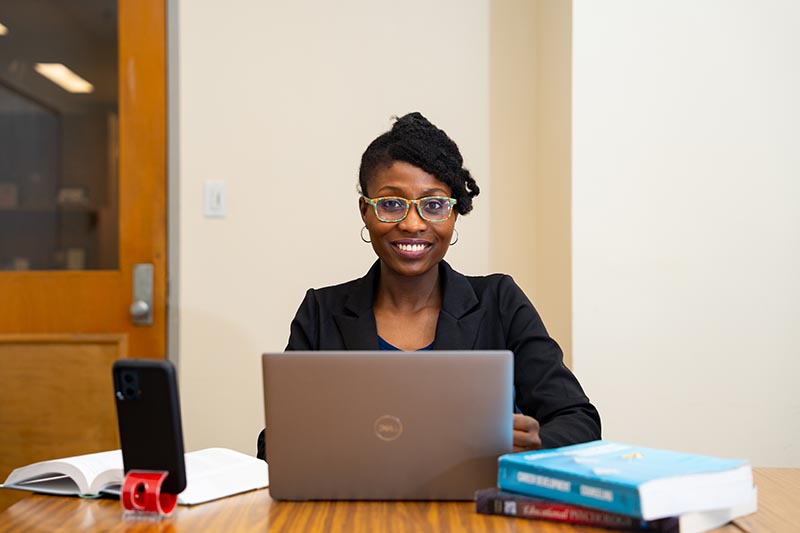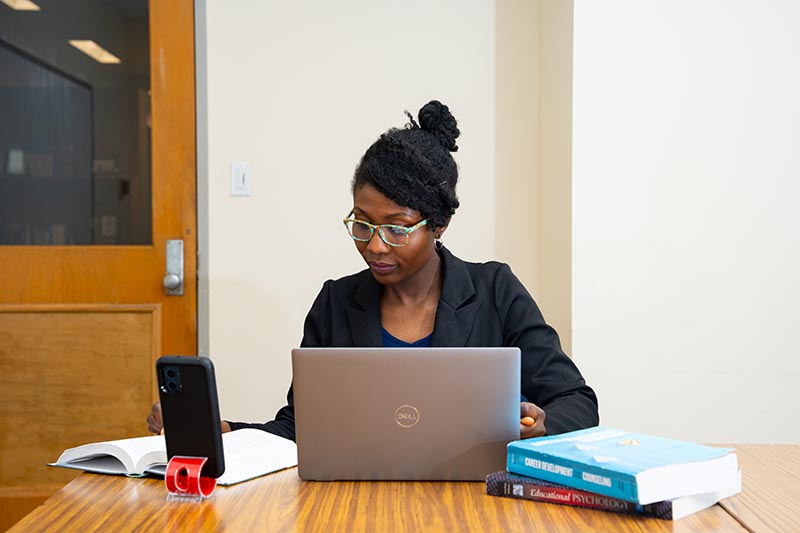Oseremi Olivia Jagbojo - Graduate Ag Research Spotlight
I saw the dynamism in the field, the technology, the youth and community development, the sustainability. It feels like everybody has a seat in agriculture.
- Oseremi Olivia Jagbojo, Agricultural Sciences Education and Communication
The student
Growing up in bustling Lagos, Nigeria, the largest city in Africa, agriculture was the furthest thing from Oseremi Olivia Jagbojo’s mind. She thought she’d follow her mother into the medical field, but when it came time to apply to college, she was offered a spot in an agricultural economics department instead. She had to decide: take the spot, or delay college and hope to gain admissions to medicine later. She decided to give agricultural economics a try.
Jagbojo went on to earn two master’s degrees – one in agricultural economics, one in communication management – but still wasn’t sure if agriculture was for her. It was only after discovering Purdue’s PhD program in Agricultural Sciences Education and Communication that everything clicked.
“It consolidated my agriculture background, my love for teaching, and my communications management degree,” she says.
The research
“Coming to Purdue, I saw that agriculture was about solving global challenges and about transformative change in the actual sense, not just in words,” Jagbojo says. “I saw the dynamism in the field, the technology, the youth and community development, the sustainability. It feels like everybody has a seat in agriculture.”
Jagbojo’s own work focuses on helping others discover these opportunities. This means reframing how we present the subject when asking students about future careers, she says. Many children, especially in cities, hear ‘agriculture’ and imagine working in a barn full of cows. When asked whether they’re interested in such a career, they say no – just as Jagbojo herself almost did. Jagbojo hopes to find ways to show them agriculture’s enormous reach and relevance.
“What I want to do is examine how we frame questions,” she says. “The way questions about career interest in agriculture are framed affect urban students’ self-reported interest in agriculture and natural resources.” Urban youth may have often been inaccurately portrayed as lacking interest in agriculture, food and natural resources because the field hasn’t been authentically presented to them.
Opportunities
As a graduate student, Jagbojo has worked for Purdue’s 4-H extension program, in the Office of Multicultural Programs, and as a technical consultant with USAID, collaborating with a university in Iraq to support the development of agricultural extension programs.
Her experience with 4-H was especially inspiring. “I’ve met adults who credit their ability to go to college to 4-H,” she says. “I hope in the near future I will be able to replicate what 4-H does in my home country.”
She’s already launched an urban youth program in Nigeria, where teens learn about gardening in containers.
“My goal is to inspire young people to see agriculture for what the field truly is, with all its potential and relevance and innovations,” she says. “It’s easy to see that medicine is relevant, but with agriculture, you have to show them.”
She’s been lucky to have extraordinary mentors at Purdue, she says. “You want a mentor who is genuine and concerned with your overall success, and that’s what I’ve found in my advisor, Mark Russell,” she says. “He’s quite an inspiration.”
Future plans
Jagbojo’s passion is teaching, and she hopes to find a faculty position after graduation. When she’s not immersed in her grad work, she spends time with her husband and two children, ages 3 and 8, and experiments in the kitchen.
“I like to create meals that blend flavors of Nigeria and America,” she says. “Let’s call it the Americo-Nigerian kitchen.”





